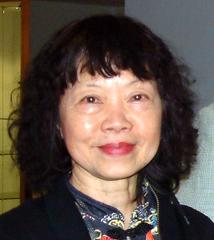Mae-Wan Ho
(scientist, activist) | |
|---|---|
 | |
| Born | 12 November 1941 – |
| Died | 24 March 2016 (Age 74) |
| Nationality | UK |
| Alma mater | Hong Kong University |
Biochemist among the first warning against the dangers of genetic engineering | |
Mae-Wan Ho was a researcher of biochemical genetics, and among the first to warn of the dangers of genetic modification (GMO). While GMO supporters and advocates criticized her (and dominate her Wikipedia article), her work provided important information about biotechnological issues, as well as sustainability, climate change and the nature of water.[1]
In year 2000, she wrote:
Genetic engineering involves designing artificial constructs to cross species barriers and to invade genomes. In other words, it enhances horizontal gene transfer — the direct transfer of genetic material to unrelated species. The artificial constructs or transgenic DNA typically contain genetic material from bacteria, viruses and other genetic parasites that cause diseases as well as antibiotic resistance genes that make infectious diseases untreatable. Horizontal transfer of transgenic DNA has the potential, among other things, to create new viruses and bacteria that cause diseases and spread drug and antibiotic resistance genes among pathogens. There is an urgent need to establish effective regulatory oversight to prevent the escape and release of these dangerous constructs into the environment, and to consider whether some of the most dangerous experiments should be allowed to continue at all.[2]
Biography
| Interview with Mae-Wan Ho. The subject of genetic engineering starts at 44:15 |
Ho received a PhD in biochemistry in 1967 from Hong Kong University, was postdoctoral fellow in biochemical genetics, University of California, San Diego, from 1968 to 1972, senior research fellow in Queen Elizabeth College, lecturer in genetics (from 1976) and reader in biology (from 1985) in the Open University, and since retiring in June 2000 visiting professor of biophysics in Catania University, Sicily.[3][4]
Ho died of cancer in March 2016.[5][6]
“What makes genetic engineering biotechnology dangerous, in the first instance, is that it is an unprecedented, close alliance between two great powers that can make or break the world: science and commerce. Practically all established molecular geneticists have some direct or indirect connection with industry, which will set limits on what the scientists can and will do research on, not to mention the possibility of compromising their integrity as independent scientists.
.
The worst aspect of the alliance is that it is between the most reductionist science and multinational monopolistic industry at its most aggressive and exploitative. If the truth be told, it is bad science working together with big business for quick profit, aided and abetted by our governments for the banal reason that governments wish to be re-elected to remain in ‘power.’”
Mae-Wan Ho (1997) [7]
Sterility Gene
- Full article: Genetic Extinction Technology
- Full article: Genetic Extinction Technology
Ho, together with Joe Cummins of the University of Western Ontario, has argued that a sterility gene engineered into a crop could be transferred to other crops or wild relatives and that "This could severely compromise the agronomic performance of conventional crops and cause wild relatives to go extinct". They argued that this process could also produce genetic instabilities, which might be "leading to catastrophic breakdown", and stated that there are no data to assure that this has not happened or cannot happen.[8] This concern contrasts with the stated reason why these sterile plants were developed, which was to prevent the transfer of genes to the environment by preventing any plants that are bred with or that receive these genes from reproducing.[9]
A Document by Mae-Wan Ho
References
- ↑ https://web.archive.org/web/20170214194008/http://www.wessex.ac.uk/news/general-news/910-obituary-mae-wan-ho
- ↑ https://ratical.org/co-globalize/MaeWanHo/horizontal.html
- ↑ https://web.archive.org/web/20080707034050/http://www.indsp.org/MWHcv.php
- ↑ http://www.bio.davidson.edu/people/kabernd/seminar/2004/GMbios/MT.html
- ↑ http://www.samburcher.com/articles/public-health/109-tribute-to-dr-mae-wan-ho-1941-2016.html
- ↑ https://web.archive.org/web/20170805062037/http://www.wessex.ac.uk/news/general-news/910-obituary-mae-wan-ho
- ↑ https://web.archive.org/web/20161222090003/https://bangmosnow.com/2016/05/20/in-memory-dr-mae-wan-ho-ban-gmos-now/
- ↑ https://www.theguardian.com/science/2003/may/19/gm.food
- ↑ https://www.ncbi.nlm.nih.gov/pmc/articles/PMC3471138